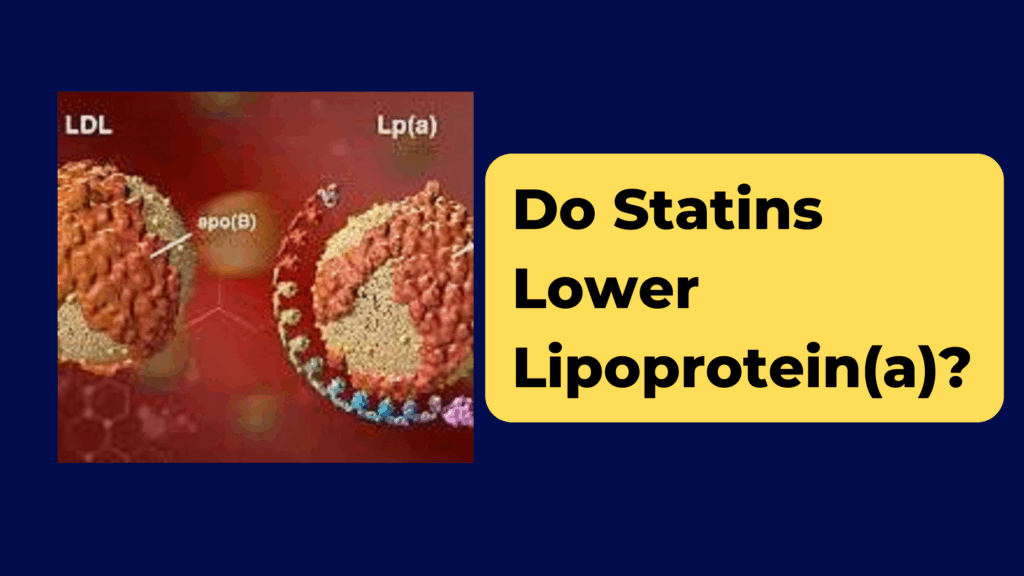Introduction
Lipoprotein (a), or Lp(a), is often called the “silent risk factor” for heart disease. It floats in your blood, carrying fats and proteins. Most people don’t realize that high Lp(a) levels can put them at serious risk. At the same time, statins are popular for managing cholesterol. But do these common drugs lower Lp(a)? Many wonder about this connection. As research continues, clear answers help guide treatment choices. Let’s explore the link between statins and lipoprotein (a) so you can understand your options better.
What is Lipoprotein (a) and Why Does it Matter?
Understanding Lipoprotein (a)
Lipoprotein (a) is a tiny particle made of fats and proteins. It looks similar to LDL, often called “bad cholesterol,” but with a key addition. It has a special protein called apolipoprotein (a) attached to LDL. This extra part makes Lp(a) unique. Unlike LDL or HDL, which can fluctuate based on diet or lifestyle, Lp(a) remains pretty much the same over your life. It’s mainly linked to your genes. If your family has high levels, you likely will too.
Lipoprotein (a) and Cardiovascular Risk
High Lp(a) levels are linked to a greater risk of heart disease, stroke, and blocked arteries. Studies show that people with elevated Lp(a) are twice as likely to develop heart problems. In fact, even if your LDL cholesterol is low, high Lp(a) can still cause damage. Doctors now recommend testing for Lp(a) during regular checkups, especially if you have a family history of heart issues. Knowing your Lp(a) level can help prevent surprises later on.
How Do Statins Work in Cholesterol Management?
Mechanism of Action
Statins work by blocking an enzyme in your liver called HMG-CoA reductase. This enzyme helps produce cholesterol. When statins block it, your liver makes less cholesterol. The result? Blood levels of LDL cholesterol drop. You tend to see improvements in your overall lipid numbers. For many, this means fewer clogged arteries and a healthier heart.
Commonly Prescribed Statins
Here are some of the most commonly used statins:
- Atorvastatin (Lipitor)
- Rosuvastatin (Crestor)
- Simvastatin (Zocor)
- Pravastatin (Pravachol)
- Lovastatin
Doctors usually start with a moderate dose, then adjust based on your response. Most see a 20-60% reduction in LDL levels, which helps reduce heart attack risk.
Limitations and Side Effects
Despite their benefits, statins aren’t perfect. Some people experience muscle aches, tiredness, or stomach issues. Rarely, they can cause serious problems like liver damage. Response to statins varies; while they help many, they don’t always lower all types of cholesterol equally. Some people need additional or alternative treatments.
Do Statins Lower Lipoprotein (a)? Evidence and Insights
Clinical Research and Studies
Many studies have looked at whether statins can reduce Lp(a) levels. The majority find that statins do not cause a significant drop in lipoprotein (a). Some research even suggests that statins may slightly raise Lp(a) in certain cases. A 2020 review of multiple trials concluded that, for most patients, statins have little effect on Lp(a).
Mechanistic Explanations
The reason why statins don’t lower Lp(a) comes down to how these drugs work. They mainly target LDL cholesterol pathways. Lp(a), with its unique protein, isn’t easily affected by this process. Its genetic basis makes it resistant to standard cholesterol drugs. Think of it like trying to fix a stone in your shoe with a band-aid — it just doesn’t address the root cause.
Expert Pharmacological Perspectives
Most cardiologists agree that while statins are excellent for lowering LDL, they aren’t the best choice for reducing high Lp(a). If your Lp(a) levels are high, your doctor might suggest other options. The focus should be on comprehensive treatment plans that address all your risk factors.
Alternative and Adjunctive Treatments for Elevated Lipoprotein (a)
These newer drugs can significantly lower Lp(a). They work by blocking a protein called PCSK9, which affects how your liver removes LDL and Lp(a). Studies show PCSK9 inhibitors can reduce Lp(a) by about 25-30%. They are often used for patients with genetic high Lp(a) and existing heart disease.
Niacin (Vitamin B3)
Once popular for lowering Lp(a), niacin could reduce levels by 20-30%. But recent research questions its safety and effectiveness. High doses may cause flushing, liver issues, or blood sugar problems. Many doctors now prefer other options.
Emerging Therapies
New treatments are on the horizon. Antisense oligonucleotides target the genetic production of Lp(a). Early studies show promising results, with some patients seeing reductions over 80%. These therapies are still being tested, but they hold hope for tighter control in the future.
Lifestyle Modifications
While lifestyle changes can’t drastically lower Lp(a), they can improve overall heart health. Focus on a balanced diet rich in fruits, vegetables, and whole grains. Regular exercise, quitting smoking, and maintaining a healthy weight all help lower your risk of cardiovascular disease.
Practical Recommendations for Patients with High Lipoprotein (a)
Important Diagnostics
If you have a family history of early heart disease, ask your doctor about testing for lipoprotein (a). Routine lipid panels don’t measure Lp(a). Special blood tests are needed. Understanding your levels can help shape your treatment plan.
Management Strategies
Since statins don’t lower Lp(a) much, your doctor might recommend other therapies like PCSK9 inhibitors. Always keep track of your Lp(a) levels over time. Your treatment should be tailored to your overall risk profile, combining medications, lifestyle, and regular checkups.
Expert Advice
Work closely with a healthcare professional who understands lipid disorders. Stay current with new developments and clinical trials. Knowledge empowers you to make the best choices for your heart health.
Conclusion
While statins are fantastic for lowering LDL cholesterol, they don’t significantly impact lipoprotein (a). High Lp(a) remains a unique risk factor that needs special attention. Emerging options like PCSK9 inhibitors show promise in reducing Lp(a). For best results, combine medication, healthy habits, and personalized care. Keep working with your healthcare provider, and stay informed about new treatments. Managing high Lp(a) is a puzzle, but with the right pieces, you can protect your heart for years to come.
NOTE: Nutritional supplements like Lypro-C can lower lpa.

